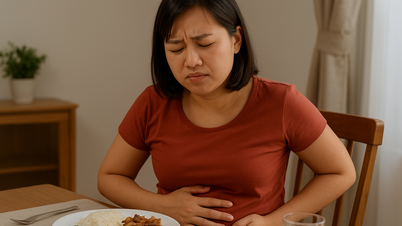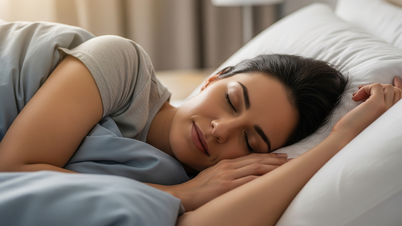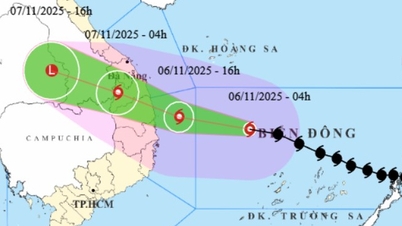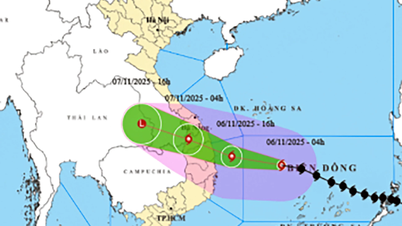1. Insomnia – a 'silent' but common symptom in menopausal women
- 1. Insomnia – a 'silent' but common symptom in menopausal women
- 2. Why does menopause cause sleep disorders?
- 3. Treatments for insomnia during menopause
- 4. Lifestyle adjustments – the key to good sleep
- 4.1. A balanced, nutritious diet helps you sleep more deeply
- 4.2. Exercise regularly
- 4.3. Maintain good sleep hygiene habits
- 4.4. Natural therapies to aid sleep
- 4.5. Keep your mind relaxed – the foundation of sleep
- 5. Does insomnia continue after menopause?
About 40 - 60% of women in menopause experience insomnia. According to Dr. Mary Rosser - Director of the Center for Integrative Women's Health , Irving Medical Center, NewYork-Presbyterian/Columbia University (USA), common problems are difficulty falling asleep, waking up too early or not sleeping deeply...
When you wake up and try to go back to sleep, stress and anxiety often arise. Chronic sleep deprivation causes brain fog, irritability, fatigue and increases the risk of heart disease, depression, dementia and traffic accidents.
Statistics show that menopausal women with insomnia often have a higher frequency of hot flashes (42% compared to 14%). Hot flashes and night sweats disrupt sleep, creating a vicious cycle that is difficult to break.

About 40 - 60% of women in menopause report having trouble sleeping (insomnia).
2. Why does menopause cause sleep disorders?
The main cause is a sharp drop in estrogen, an important hormone that helps regulate many functions in the body. "Hormonal fluctuations lead to hot flashes or night sweats - the leading cause of women waking up in the middle of the night," said Dr. Rosser.
About 75% of women in menopause experience severe hot flashes. Weight gain is also a contributing factor to insomnia: up to 70% of women aged 50-60 gain an average of 0.75kg per year. Being overweight increases the risk of obstructive sleep apnea, which causes interrupted sleep.
In addition, anxiety and depression Feelings of anxiety, which are common during this stage, further contribute to restless sleep.
3. Treatments for insomnia during menopause
If night sweats are the main cause, menopausal hormone therapy (MHT) – or hormone replacement therapy (HRT) – may help. Estrogen supplementation helps regulate body temperature, reduces hot flashes, and aids sleep. Progesterone is sometimes prescribed in combination to reduce the risk of endometrial cancer and has a mild sedative effect.
HRT comes in many forms: pills, patches, gels... However, women with a history of breast cancer, ovarian cancer, or a high risk of heart disease should consider carefully. In that case, the doctor may prescribe SSRI antidepressants, which help control body temperature, reduce hot flashes, and aid sleep. The dose of SSRIs used to treat insomnia is usually much smaller than the dose used to treat depression.
Gabapentin (neurontin) – an epilepsy medication – may also be prescribed to help improve sleep when taken at night.
In addition to medication, cognitive behavioral therapy for insomnia (CBT-I) is effective in the long term. It helps people identify and change thoughts and behaviors that interfere with sleep, and learn relaxation techniques.
4. Lifestyle adjustments – the key to good sleep

A healthy diet is not only good for overall health but also improves sleep.
4.1. A balanced, nutritious diet helps you sleep more deeply
A healthy diet is not only good for overall health but also improves sleep:
- Tryptophan: Found in cheese, nuts, turkey – helps the body produce serotonin, a hormone that regulates sleep.
- Glycine: Found in meat, fish, cheese, vegetables – helps the nervous system relax.
- Resveratrol: In grapes, wine – acts as a phytoestrogen, reduces hot flashes.
- Isoflavones: From soybeans, peas, lentils – help improve sleep thanks to estrogen-like effects.
- Vitamin E: Found in seeds, fruits like avocado, mango – supports sleep quality.
- Iron and folate: From green leafy vegetables, beans – help reduce restless leg syndrome, a cause of insomnia.
Limit foods containing sugar and simple starches, because lack of sleep can easily make you crave sweets, increasing the risk of weight gain and diabetes.
4.2. Exercise regularly
Regular exercise helps you fall asleep faster and sleep more deeply, by increasing melatonin production and regulating your body temperature. Recommended exercises include walking, cycling, dancing, weight training, or balance exercises.
If you are busy, you can start with light activities such as jogging in place for 10 minutes or jumping around the house, as long as you avoid exercising too close to bedtime to avoid stimulating your nerves.
4. 3. Maintain good sleep hygiene habits
- Go to bed and wake up at the same time every day.
- Relax before bed: Read a book, take a warm bath, listen to music, drink warm milk.
- Keep the bedroom dark, quiet, and cool (18–20°C).
- Wear sweat-wicking pajamas and use cooling sheets, pillows, and mattress pads to reduce night sweats.
- Avoid electronic screens at least 30 minutes before bed.
- Do not eat large meals or drink alcohol, coffee, or smoke close to bedtime.
4.4. Natural therapies to aid sleep
- Acupuncture – a traditional medicine method that stimulates acupuncture points, is believed to increase estrogen levels, thereby improving sleep during perimenopause.
- Food supplements:
- Melatonin: helps regulate sleep-wake cycles, effectiveness depends on the individual.
- Magnesium: found in green leafy vegetables, grains, nuts – helps relax the nervous system, aids sleep.
- Black cohosh: a familiar herb that helps reduce hot flashes, night sweats, and promote sleep.
4.5. Keep your mind relaxed – the foundation of sleep
When the mind is filled with anxiety, sleep is difficult to find. Methods such as mindfulness meditation, deep breathing, yoga help to relax, reduce stress, and improve mood and sleep in menopausal women.
"Perimenopause and menopause are individual experiences, and each person needs to have their treatment tailored to their individual needs," Rosser emphasizes.
5. Does insomnia continue after menopause?
Insomnia often begins in perimenopause and can last until after the menstrual cycle ends. However, many women sleep better after menopause, when symptoms subside.
If insomnia is caused by menopausal symptoms, hormone therapy can be continued for several years. As sleep improves, most other problems improve, leaving women feeling healthier and more balanced.
"Don't try to endure insomnia or any other symptoms of menopause. Be proactive and see your doctor for advice and appropriate treatment," Rosser recommends.
Readers are invited to see more:
Source: https://suckhoedoisong.vn/vi-sao-phu-nu-man-kinh-de-mat-ngu-lam-the-nao-de-ngu-ngon-giac-169251030223822475.htm


































![[Photo] Opening of the 14th Conference of the 13th Party Central Committee](https://vphoto.vietnam.vn/thumb/1200x675/vietnam/resource/IMAGE/2025/11/05/1762310995216_a5-bnd-5742-5255-jpg.webp)

![[Photo] Panorama of the Patriotic Emulation Congress of Nhan Dan Newspaper for the period 2025-2030](https://vphoto.vietnam.vn/thumb/1200x675/vietnam/resource/IMAGE/2025/11/04/1762252775462_ndo_br_dhthiduayeuncbaond-6125-jpg.webp)












































































Comment (0)